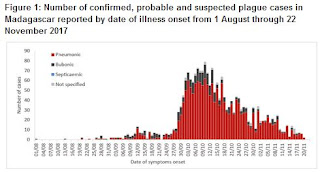#12,020
With the back-filling of old cases the totals continue to rise, but the overall trend in Madagascar remains encouraging, with no new confirmed pneumonic plague cases in nearly two weeks.
To date, 2,348 suspected, probable, and confirmed cases of plague have been reported since August 1st, with 202 deaths.Although endemic in Madagascar, this year's total is unusual in both its size, and the fact that the majority of cases are of the pneumonic variety. With today's report the WHO lowers their estimate of the risk of plague at the national level too moderate.
Plague – Madagascar
Disease outbreak news
27 November 2017
From the 1 August through 22 November 2017, a total of 2348 confirmed, probable and suspected cases of plague, including 202 deaths (case fatality rate 8.6 %), were reported by the Ministry of Health of Madagascar to WHO. There were 1791 cases of pneumonic plague, of which 22% were confirmed, 34% were probable, and 44% were suspected. In addition to pneumonic cases, there were reports of 341 cases of bubonic plague, one case of septicaemic plague and 215 cases with type unspecified.
In total, 81 healthcare workers have had illness compatible with plague, none of whom have died.
Since the beginning of the outbreak, cases of pneumonic and bubonic plague have been detected in 55 out of 114 districts (48%), including non-endemic areas and major cities. Analamanga Region has been the most affected, with 68% of the cumulative reported cases.
All contacts identified (7289) during this outbreak have completed their course of prophylactic antibiotics. Eleven contacts developed symptoms compatible with plague and were classified as suspect cases. All contacts had completed their follow up.
The Institut Pasteur Madagascar has cultured 33 isolates of Yersinia pestis, which were all sensitive to the antibiotics recommended by the National Program for the Control of Plague.
Plague is endemic in some areas of Madagascar and additional cases of plague may occur, at least until the end of the plague season in April 2018. It is therefore important that control measures continue through the end of the plague season.
WHO risk assessment(Continue . . . )
No new cases of confirmed bubonic plague have been notified after 8 November 2017 and no new cases of confirmed pneumonic have been notified since 14 November 2017. All contacts finished follow up on 19 November 2017. However, plague in Madagascar is seasonal and WHO expects additional reports of cases. It is therefore important for the Ministry of Health, WHO, and partners to sustain prevention and response activities until April 2018. A longer term strategy will be needed for plague prevention, preparedness, and response.
Based on the current epidemiology and response capacity, WHO estimates the risk of plague at the national level is moderate. The risk at the regional and global levels is low.
